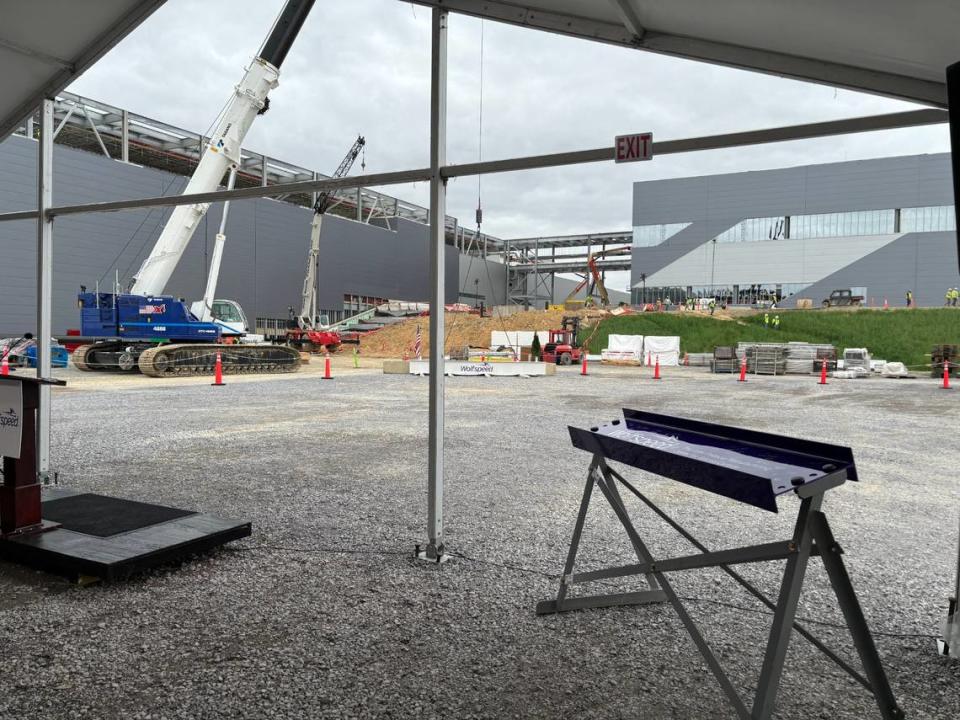Open Source: The global semiconductor industry relies on a single NC mountain town
I’m Brian Gordon, tech reporter for The News & Observer, and this is Open Source, a weekly newsletter on business, labor and technology in North Carolina.
How strict is security at the Sibelco mine in Spruce Pine, North Carolina? In his 2023 book “Material World,” Ed Conway spoke to someone familiar with the site who said, “When contractors from other companies are brought in for repairs [at the plant] they are literally blindfolded and marched into the factory up to the machine they need to fix.”
About an hour’s drive northeast of Asheville, the mountain town of Spruce Pine is where Sibelco, a private Belgium mineral company, digs for the world’s purest quartz.
“I’ve been sent to Brazil, I’ve been sent to Australia, and nothing matches the final purity of the Spruce Pine quartz,” Alex Glover, a geologist near Spruce Pine who has worked for several mining companies, told me in a phone interview this week.
Quartz is essential for many modern technologies, including solar panels, fiber optics and semiconductors.
“It is rare, unheard of almost, for a single site to control the global supply of a crucial material,” Conway writes. “Yet if you want to get high-purity quartz — the kind you need to make those crucibles without which you can’t make silicon wafers — it has to come from Spruce Pine.”
This high-purity quartz formed about 380 million years ago, during the Ordovician geological period, when continental Africa smashed into today’s North America. The area’s lack of water was a benefit; Glover explained water induces mineral impurities.

Throughout much of the 20th century, miners around Spruce Pine were more interested in the land’s mica and feldspar than its quartz. In fact, Glover said companies used to throw the latter away. Then about 30 years ago, demand for quartz soared with the rise of silicon semiconductor wafers, which are converted into chips that power everything from phones to cars.
When it comes to making these wafers, extreme purity is essential. “The more perfect the atomic structure in your silicon, the more easily and freely electrons can flow around,” Conway writes.
Glover explained even a tiny impurity, like one less than 50 parts per billion, can ruin the final product. That is why Sibelco, and more recently a second company, Quartz Corp., have heavily invested at mines around Mitchell County. In April 2023, Sibelco announced a $200 million investment to double production at the site by next year. And the company said it’s exploring additional expansion by 2027.
In its most recent annual report, Sibelco said the Spruce Pine site produced nearly 60% more high-quality quartz in 2023 than it did in 2019. The company is now the largest employer in Mitchell County, according to the North Carolina Department of Commerce.
Its mines (along with those of Quartz Corp.) are located north of downtown in an area called the Spruce Pine Mining District. They appear on Google Maps like vast, white sandy beaches. Attention on the sites increased earlier this month when Ethan Mollick, an author and professor at the Wharton School of the University of Pennsylvania, posted about the mines and Conway’s book on X.

Now this is where I should say Sibelco denied that contractors are blindfolded when they visit. “To the best of our knowledge, the practice of blindfolding contractors does not occur at any Sibelco sites,” a spokesperson told me in an email.
But Glover said blindfolding visitors to protect industry practices was certainly commonplace during his career in Spruce Pine mines. And whether eyes are actually covered today, Sibelco and Quartz Corp. are serious about security, he said.
“You cannot get into these plants here,” Glover said.
The secrecy is understandable. Sibelco relies on its site for business. And the rest of the world relies on the site to function.
CHIPS dollars coming?
In not unexpected news, the Durham semiconductor company Wolfspeed confirmed to me it applied for federal CHIPS Act funding earlier this month and anticipates hearing back about the $52 billion program in June.
“We are building the world’s largest silicon carbide corridor, stretching from North Carolina to New York, and we believe this fits nicely with the federal government’s plans to fortify semiconductor production here in the United States,” Wolfspeed spokesperson Tyler Gronbach said in an email.
Where would Wolfspeed spend the money?
Well, on Tuesday, the company held a “topping out“ construction ceremony at its future $5 billion plant in western Chatham County. Everyone — from its CEO, to its contractor, to U.S. Sen. Thom Tillis — noted how quickly the enormous structure was erected. Like the fastest pace some had ever seen for a project of this size.

Durham company leaves jobs deal
North Carolina awards a lot of economic incentives … and cancels plenty of them early, too.
This week’s batch of terminations included a 2020 grant for the Durham biopharma firm BioAgilytix to add close to 900 jobs near Research Triangle Park. The state didn’t pay out any taxpayer money under the deal. BioAgilytix, which still has more than 500 local employees, told North Carolina it would stop growing its headcount due to “downturns in biotech funding in the last two years.”
How bad is the sector’s current funding landscape? On Thursday, I asked Art Pappas, who heads the biotech-focused fund Pappas Capital in Durham. He said the dip wasn’t a surprise after “very heady” valuations and spending in 2021.
“We were expecting some kind of a correction and anticipating that the public markets will at some point either correct or shut down for some period,” he said. But he has been surprised that the biotech sector remains, in his words, “depressed.”
According to the financial database PitchBook, venture capital investing in biopharmaceuticals specifically fell nearly 20% last year, from $36.7 billion in 2022 to $29.9 billion.
The rest of this week’s NC tech headlines
Greensboro-bound Boom Supersonic tested its supersonic jet for the first time — albeit at below supersonic speeds.
Cary isn’t hearing from Epic Games about its plans to build a new headquarters on the site of the former Cary Towne Center mall. And the area grows more desolate.
Dollar General added a new store in North Carolina every nine days on average last year, new data from the discount chain shows. This has been the company’s expansion rate statewide for the past 15 years, to the annoyance of some rural residents.

The popular YouTuber/podcaster MKBHD posted a review of the VinFast VF8, the inaugural U.S. car from the Vietnamese company moving into Chatham County. While it wasn’t a total pan (like his recent viral review of the Fisker Ocean) MKBHD had more tempered criticisms of the VF8 and did not recommend it.
And for a much less informed opinion of the VF8, here’s my test drive report from last week.
An Atlanta tech firm used by police to capture license plate data risks being banned from doing business in the state if it misses a key application deadline, my colleague Tyler Dukes writes. Called Flock Safety, its cameras snap license plates and other details like the color, make and type of passing vehicles. More than 70 law enforcement agencies in the state use them.
Momentum, a Raleigh-based educational technology company, will close after six years, its founder Jessica Mitsch Homes said on LinkedIn. “Momentum has helped over 400 people transition into careers in the technology industry with incredible success,” the company said in its announcement.
National tech happenings
Amazon put an additional $2.75 billion into the AI startup Anthropic, a ChatGPT rival.
Fallen cryptocurrency king Sam Bankman-Fried was sentenced to 25 years in prison Thursday. Prosecutors had sought a prison sentence of 40 to 50 years while Bankman-Fried’s defense attorney asked for closer to five years, telling the judge his client was an “awkward math nerd” rather than a “ruthless financial serial killer.” The government accused him of stealing $10 billion.
Intel received up to $8.5 billion through the federal CHIPS Act last week. Wolfspeed hopes to join them soon.
Thanks for reading!


